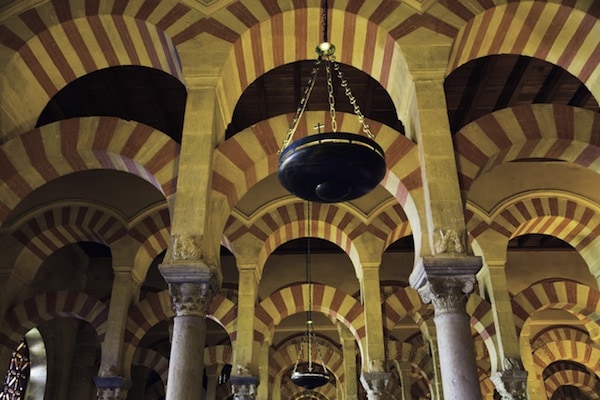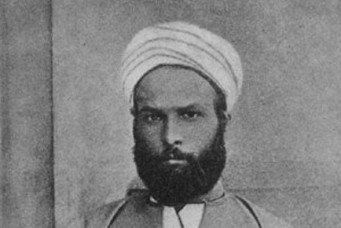Maher-affleck Debate: An Islamic View
Bill Maher’s assertion that Islam inspires conflict is wrong. But Ben Affleck’s impassioned defense—that most Muslims just want to live peaceful lives—also ignores the fact that today the Islamic world is extremely violent.

Interior of Mosque of Cordoba, Spain, June 3, 2014. Danny Lehman/ Corbis.
Bill Maher’s assertion, in last week’s episode of his HBO talk show, that Islam inspires conflict is wrong. But Ben Affleck’s impassioned defense—that most Muslims just want to live peaceful lives—also ignores the fact that today the Islamic world is extremely violent.
What both sides fail to understand is that, unlike the experiences of other grand monotheistic religions, which have evolved significantly from their original versions, today’s Islam has not changed from that of ten centuries ago. That makes Islam, to many observers at least, a seventh-century belief and value system at the heart of the twenty-first century.
In the seventh century, Islam emerged from the barren deserts of the Arabian Peninsula and quickly encountered the eastern Mediterranean’s trading societies, Persian civilization, and Egypt’s rich cultural mix. By the ninth century, Islam had come to dominate the whole of the Caucasus, Iran, most of the Indian subcontinent, the Iberian Peninsula, in addition to the whole of Arabia, the eastern Mediterranean, and North Africa. The Arab dynasties that ruled these huge land masses were savvy and confident enough to open their courts to intellectuals from the societies they governed. They realized that incorporating the cultures of these societies would strengthen their rule. Over time, this openness towards the ‘other’ created a rich social milieu, especially in the Islamic empire’s large urban centers—in Iraq, Syria, Egypt, and Andalucía (Spain). One of human history’s most inspiring experiments in inter-cultural exchange, cross-fertilization of ideas, and tolerance took place in Cordoba, Fez, Cairo, Damascus, and Baghdad.
Inevitably, new, creative ways of thinking about Islam began to appear. Two developments were particularly transformative. The first was the emergence of Sufism: a brand of Islam that regarded the Prophet Mohammed’s message as one among other approaches to understanding divinity, the connection between God and man, and the meaning of life. Sufism, which slowly but surely grew in the Caucasus, parts of India, Iraq, Kurdistan, and Turkey, diluted the emphasis on practices and rituals. Sufism evolved various mystical schools of thought, that have been very tolerant not just of non-Muslims but of ideas that large sections of Muslims today would consider heretic.
The second was the emergence of Islamic falsafa (philosophy). Some of the most distinguished names in Islamic intellectual history—such as Ibn Sina (Avicenna), Al-Farabi, Ibn Rushd (Averroes), and Al-Razi—incorporated various concepts of Greek philosophy, remnants of old occult Persian understandings of the divine, and their budding knowledge of sciences such as medicine, biology, optics, and astrology, into Islam. The bedrock of Islamic falsafa was approaching the Koran and the sayings and practices of Prophet Mohammed as an overarching framework, open to various interpretations—even by scientists and thinkers, not just scholars of Islamic jurisprudence.
These two developments resulted in vivacious intellectual and scientific atmospheres in various Islamic cities. And equally important, they were integrated into mainstream Islamic thought.
Islamic thinking changed course in the period from the late eleventh to late fourteenth century. Baghdad, Damascus, Aleppo, Acre, Jerusalem, Cairo, and later Cordoba, Grenada, and Seville were subjected to attacks from the Tatar Mongols, Crusaders, and Spaniard Reconquistadors (who successfully sought to eject the Muslims and Jews from the Iberian Peninsula). For the first time in over five centuries (since its emergence from the Arabian Peninsula), Islam was on the defensive. Thriving, opulent, and often decadent Islamic centers, such as Baghdad and Cordoba, were sacked. In less than two centuries, the Islamic empire morphed from the world’s superpower and center of science and art (outside China) to a string of vulnerable and anxious societies.
Confidence was gradually lost. And in different parts of the Islamic world, rigorous, assertive, and charismatic scholars—such as Ibn Taymiyyah—spread the message that intellectual excess, deviation from “true Islam,” and permissiveness were the reasons behind the descent of the Islamic world. Various social, political, and geopolitical factors lent support to that message, especially in thirteenth and fourteenth century Egypt and the eastern Mediterranean.
Across the Islamic world, regimes marginalized, and in several cases persecuted, creative Islamic thinkers. Islamic falsafa and Sufism survived, but privately, far from the limelight, and on the margins of the Islamic world, not at its core (the Arabian Peninsula, the eastern Mediterranean, and North Africa).
There were moments of major successes for these schools of thought, and especially for Sufism, in the sixteenth and seventeenth century in Ottoman Turkey. But by and large, the Islamic world continued its march back towards strict, literalist, and conservative interpretations of Islam. By the eighteenth century, the most powerful strand of Islamic thinking was Salafism: the school of thought that looked at the early, “pure” Islamic communities of the seventh century as the model that Muslim societies should aspire to. Cosmopolitan, diverse, intellectually rich, and confident ninth, tenth, and eleventh century Iraq, Syria, Egypt, and Andalucía became footnotes in Islam’s story.
Salafism, in various forms, continued to dominate Muslim societies in the twentieth century. Today, peaceful but highly conservative forms of it, such as Wahhabism, are the ruling doctrine in different Islamic countries (in the Gulf). Violent, jihadist versions inspire groups such as Al-Qaeda, Boko-Haram, and the Islamic State in Iraq and Syria (ISIS).
The vast majority of Muslims are not Salafists. But the Islam the vast majority of Muslims today know is one that has been denied creative thinking (especially in theology) since the twelfth and thirteenth centuries. So when Bill Maher, and observers like him, look at it, they see a seventh century value system in the twenty first century. For Ben Affleck, and other sympathizers, Islam is very similar to other monotheistic religions, and Muslims, like other ordinary people, just want to live simple and peaceful lives. The first viewpoint fails to see the complexity of the Islamic experience. The second does not ascribe any specific features to Islamic societies, and so falls in the same fault.
Serious dialogues on Islam did take place, at the heart of the Islamic world, not now but almost exactly a century ago. Then, courageous thinkers like Gamal El-Din Al-Afghani and Mohamed Abdou argued for a return to the “rationality” that had characterised Islamic discourse in earlier centuries; they strongly campaigned for overhauling education across the Islamic world to focus on creative thinking; they challenged Islamic authorities in the eastern Mediterranean, Egypt, and Turkey to recognize Persian, Helenic, and Mediterranean influences on their civilization; and urged Islamic societies to see how much they had lagged behind, in almost all fields of human endeavour. The same message remains valid today.
Tarek Osman is the author of the international bestseller Egypt on the Brink.



